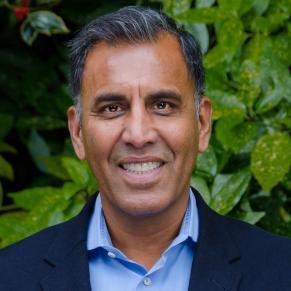Schar School of Policy and Government professor J.P. Singh leads a team of researchers from across George Mason University campuses that has been awarded a three-year, $1.39 million grant to study the economic and cultural determinants for global artificial intelligence (AI) infrastructures—and describe their implications for national and international security.

The grant was awarded by the Department of Defense’s esteemed Minerva Research Initiative, a joint program of the Office of Basic Research and the Office of Policy that supports social science research focused on expanding basic understanding of security. This year’s 17 university teams were selected from more than 220 proposals and will receive a total of $28.7 million in grants.
“Perhaps the most important and unique feature of our project is that we will use sophisticated big data models in computer and social sciences to specify the economic and cultural determinants,” said Singh, the principal investigator of the grant.
“This analysis will be important for showing how cultural values and institutional priorities embedded in AI shape security—and insecurity—in the 21st century.”
The final products from the grant will include forecasting models for AI infrastructures for different national and global contexts, enriched with field research and reports.
“This prestigious award recognizes the kind of transformative and multidisciplinary research for which Mason and the Schar School are known,” said Mark J. Rozell, dean of the Schar School. “Professor Singh's research cuts across academic boundaries to engage the insights of different disciplines in understanding complex public policy issues. His work speaks to not only academic researchers, but opinion leaders and policymakers as well.”
Singh has assembled a transdisciplinary team of veteran researchers from several academic fields to contribute to the project. In addition to Singh, a political economist, fellow researchers include:
- Amarda Shehu, an award-winning machine learning engineer from Mason’s Department of Computer Science at the Volgenau School of Engineering and co-director of Mason’s Center for Advancing Human-Machine Partnerships (CAHMP);
- Antonios Anastasopoulos, an assistant professor of computer science at Mason’s College of Engineering and Computing;
- Michael Hunzeker, an assistant professor at the Schar School and associate director of Mason’s Center for Security Policy Studies; and
- Jesse Kirkpatrick, an ethicist, research assistant professor, and acting director of Mason’s Institute for Philosophy and Public Policy.
The team originated from Mason’s interdisciplinary Center for Advancing Human-Machine Partnerships (CAHMP), which researches how to structure and optimize reciprocal relationships between humans and assistive computing systems.
“This award speaks to the ability of this diverse team to identify unique intersectional problems and novel, cutting-edge methodologies,” said Shehu. “It also speaks to the strength of this multidisciplinary team that came together through many deliberate team-forming activities in the Center for Advancing Human-Machine Partnerships, their dedication to understanding one another across disciplines, and ultimately their passion to advancing interdisciplinary research.”
Singh noted that three graduate students and a postdoctoral researcher will be hired to assist in the project.
Two of the 17 grants awarded this year went to Mason researchers. Itamara Lochard, director of Cyber Policy Studies at Mason's Center for Assurance Research and Engineering, received funding for her project, Habitus and the Information Environment: An Ethnographic Case Study of Digital Anthropology.
